KDCA’s new chief says COVID-19 still top national agenda
By Kim ArinPublished : June 9, 2022 - 15:33

OSONG, North Chungcheong Province -- The Korea Disease Control and Prevention Agency will roll out policies that safeguard the public against the COVID-19 pandemic and aid economic recovery under the new administration, KCDA’s new chief says.
Speaking at a press conference on Thursday, new KCDA chief Peck Kyong-ran said that the pandemic is one of the new administration’s top priorities, and that response measures will reflect wider implications of the pandemic.
“Disruptive variants are continuously emerging. On top of COVID-19 we’re seeing new threats such as monkeypox and mysterious hepatitis in children.”
Peck had worked closely with the Korea Disease Control and Prevention Agency throughout the pandemic as an outside expert on the advisory panel, with the first meeting dating back to Jan. 7, 2020, when Korea had yet to discover a case within its borders.
Before her appointment as KDCA chief on May 18, Peck was an infectious disease specialist at Samsung Medical Center, where she had worked since 1994. She also served as the director of the Korea Society of Infectious Diseases for nearly two years until November last year.
“As a researcher and a doctor who dealt with patients firsthand, I spent the last two years on the front lines of COVID-19 response alongside the KDCA scientists and officials,” she said.
Now that she has the power to take new actions to address COVID-19, she said she would use the opportunity to deliver policies that will not only safeguard public health, but also assist a return to everyday life.
Past the pandemic’s initial phase, the COVID-19 response has been a “challenge that intersects public health, economy and other civil liberties,” said Peck, who helms the agency as the country has already moved on from a state of emergency.
At the same time the KDCA should not “cave in” to pressures to get back to normal, or abandon measures to contain the disease when the science does not warrant it, she said.
“The KDCA has to work with the rest of the administration, and public opinion is so important. But at the end of the day our job is to follow the science rather than what’s popular.”
With Peck at the helm, the KDCA has yet to overturn decisions that were already made under a different leadership. The post-omicron response road map drafted and announced by the previous administration entails ending isolation requirement for COVID-19 patients.
On the scheduled lifting of policy, Peck said she recognizes a “high anticipation” about resuming normal activities.
“Once we do away with isolation the expected outcome is an increase in infections. If infections increase at a rate that ends up overwhelming our hospitals, then we might have no choice but to bring back some of the more restrictive measures,” she said.
On expanding the distribution of fourth vaccine doses to the general population, she said the KDCA was looking into trends in variant proportions and case rates both here and globally, as well as updates in vaccines.
“Then the decision would have to be made on whether we would need vaccines updated to better protect against variants,” she said.
During his visit to the KDCA headquarters on May 26, the Yoon had said protecting the lives and safety of Koreans was a “paramount responsibility of the government.”
“I believe there’s clear consensus and understanding within the administration that COVID-19 is still a very much ongoing problem, and that protecting lives is a top national agenda,” she said.
“As of today more than 24,000 people have lost their lives to COVID-19. The KDCA will work to protect families and communities, especially the most vulnerable among us, so that no more lives are lost from preventable tragedies.”
By Kim Arin (arin@heraldcorp.com)









![[Today’s K-pop] BTS pop-up event to come to Seoul](http://res.heraldm.com/phpwas/restmb_idxmake.php?idx=644&simg=/content/image/2024/04/17/20240417050734_0.jpg&u=)

![[Graphic News] More Koreans say they plan long-distance trips this year](http://res.heraldm.com/phpwas/restmb_idxmake.php?idx=644&simg=/content/image/2024/04/17/20240417050828_0.gif&u=)






![[KH Explains] Hyundai's full hybrid edge to pay off amid slow transition to pure EVs](http://res.heraldm.com/phpwas/restmb_idxmake.php?idx=652&simg=/content/image/2024/04/18/20240418050645_0.jpg&u=20240419100350)

